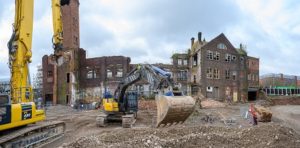Build, Build, Build welcomed but “more must be done, using home building as basis”.
West Midlands economic and construction experts have welcomed Boris Johnson’s focus on a demand-led recovery plan as Britain accelerates out of lockdown, but say “more must be done, using home-building as a basis”.
The comments from come from regional economist Dr Steve McCabe and experienced construction professional Mike Leonard, both based at Birmingham City University, as the Prime Minister made announced the Government’s ‘Build, Build, Build’ rescue package announcement in Dudley this morning.
Speaking after the PM’s announcement, Mike Leonard said, “This ‘levelling up’ package is of critical importance as we face the worst recession in living memory amid fears that unemployment could rise rapidly to levels not seen since the 1930s.
“Damage to consumer spending has, understandably, already occurred, and shows no immediate signs of returning. As we adapt to the new “normal” there is a danger that businesses and people will not spend, resulting in more bankruptcies and job losses, which suck the country into a vortex of decline. Such a vista is utterly destructive for the prospects of millions and does not serve the country well.

BCU Steamhouse 2 groundbreaking.
“What is needed is investment to fuel a demand-led recovery.”
McCabe and Leonard produced the Build Back Better: Covid-19 Economy Recovery Plan, released on Wednesday 13 May: a blueprint for a safe return to construction, a set of recommendations to help stimulate demand for new homes and home improvement, and details on how to build essential infrastructure and train a new generation of skilled workers – acting as a catalyst for growth and delivering income for HMRC.
Recommendations and observations in the plan include:
· A phased return to work following specific guidelines can ensure the protection of construction sites during pandemic
· Small house builders, often highly efficient and providers of local employment and procurement, must be given encouragement
· Address fuel poverty through direct intervention by local authorities using local companies
· Construction can offer long term skilled employment opportunities that can act as a catalyst in achieving inclusive economic growth
· Provide incentives and highlight environmental benefits for consumers to replace inefficient and outdated gas boilers
· 30,000 new social houses built per year for the next three years will address living standards, mobility and some shortfall
· Proposed Building Regulation changes should be delayed in light of exceptional circumstances posed by pandemic
· Construction must be made more attractive as a career choice to young people through regional marketing campaigns
Of particular focus in Build Back Better: Covid-19 Economy Recovery Plan are SMEs, who dominate the sector, with a suggestion that UK Plc fully engages such businesses in order to build the infrastructure and new homes the UK needs, alongside investments to deal with fuel poverty and the upgrading of existing housing stock to meet the net zero 2050 obligations.
Dr Steve McCabe said “There are grave concerns that the Coronavirus Job Retention Scheme may fail in its overall intent when, in August, Government to support for 9.3 million people’s wages starts to taper off. The fear is that companies may choose this moment to enact large redundancy programmes.
“It’s infinitely better to keep people working than to pay them unemployment benefit of less than £100 a week. This will simply cause the economy to remain stagnant for much longer than might otherwise be the case. The short-term cost, considerable as it is, is preferable to the destruction and social chaos that will accompany a long economic depression.”
Mike Leonard states: “Much attention has, quite rightly, been focused on getting Britain back to work safely with the test, track and trace informing more targeted local lock-downs. We must now focus on kick-starting the demand-side of the UK economy. Though we cannot fund jobs with public funds forever, it is essential to recognise that this is a once in a century crisis. Covid-19, following on from Brexit, has changed the dynamic. The Government should promote and support British manufacturers and SME’s. They should invest in stimulating demand as well as providing wider access to training and pay half the wage bill for apprenticeships until the end of 2021.
“This will create much needed income for individuals, revenue to the exchequer, hope for the locked out and a new generation of skilled workers. In the longer-term it is crucial we create a more resilient and self-sufficient economy, less dependent on imports, with full employment. This will help to rebalance our economy and provide a platform for inclusive growth and social cohesion.”
The“Build Back Better report proposes a £11 billion investment in the construction sector with a £22 billion return which represents 200% return on investment whist securing jobs and creating skilled employment opportunities in the manufacturing of building materials and construction for up to a million people.
The outputs of such an investment would include world class infrastructure, more high-quality new homes, a reduction in fuel poverty and positive steps towards achieving our ‘Net Zero’ 2050 Climate Change targets.
The report is attached and available to read here.


